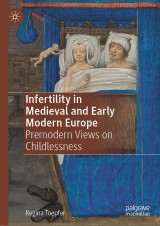Details

Infertility in Medieval and Early Modern Europe
Premodern Views on Childlessness|
117,69 € |
|
| Verlag: | Palgrave Macmillan |
| Format: | |
| Veröffentl.: | 22.11.2022 |
| ISBN/EAN: | 9783031089770 |
| Sprache: | englisch |
Dieses eBook enthält ein Wasserzeichen.
Beschreibungen
<p>This book examines discourses around infertility and views of childlessness in medieval and early modern Europe. Whereas in our own time reproductive behaviour is regulated by demographic policy in the interest of upholding the intergenerational contract, premodern rulers strove to secure the succession to their thrones and preserve family heritage. Regardless of status, infertility could have drastic consequences, above all for women, and lead to social discrimination, expulsion, and divorce.</p>
<br> Rather than outlining a history of discrimination against or the suffering of infertile couples, this book explores the mechanisms used to justify the unequal treatment of persons without children. Exploring views on childlessness across theology, medicine, law, demonology, and ethics, it undertakes a comprehensive examination of ‘fertility’ as an identity category from the perspective of new approaches in gender and intersectionality research. Shedding light on how premodern views have shaped understandings our own time, this book is highly relevant interest to students and scholars interested in discourses around infertility across history. <p></p>
<br> Rather than outlining a history of discrimination against or the suffering of infertile couples, this book explores the mechanisms used to justify the unequal treatment of persons without children. Exploring views on childlessness across theology, medicine, law, demonology, and ethics, it undertakes a comprehensive examination of ‘fertility’ as an identity category from the perspective of new approaches in gender and intersectionality research. Shedding light on how premodern views have shaped understandings our own time, this book is highly relevant interest to students and scholars interested in discourses around infertility across history. <p></p>
<p>1. Introduction.- 2. Theology: salvation stories of (in)fertility.- 3. Medicine: body concepts of (in)fertility.- 4. Jurisprudence: laws on (in)fertility.- 5. Demonology: metaphysics of (in)fertility.- 6. Ethics: ideals of life with (in)fertility.- 7. Epilogue.</p>
<p><b>Regina Toepfer </b>is Chair of Medieval German Literature at Julius-Maximilians-Universität Würzburg, Germany. </p><br><p></p>
<p>This book examines discourses around infertility and views of childlessness in medieval and early modern Europe. Whereas in our own time reproductive behaviour is regulated by demographic policy in the interest of upholding the intergenerational contract, premodern rulers strove to secure the succession to their thrones and preserve family heritage. Regardless of status, infertility could have drastic consequences, above all for women, and lead to social discrimination, expulsion, and divorce.</p><p>Rather than outlining a history of discrimination against or the suffering of infertile couples, this book explores the mechanisms used to justify the unequal treatment of persons without children. Exploring views on childlessness across theology, medicine, law, demonology, and ethics, it undertakes a comprehensive examination of ‘fertility’ as an identity category from the perspective of new approaches in gender and intersectionality research. Shedding light on how premodern viewshave shaped understandings our own time, this book is highly relevant interest to students and scholars interested in discourses around infertility across history. </p><div><p></p><p><b>Regina Toepfer</b> is Chair of Medieval German Literature at Julius-Maximilians-Universität Würzburg, Germany. </p><br><p></p></div>
Explores medieval and premodern views of infertility Draws on a wide range of primary sources, from medical texts to theology and philosophy Illustrates the emergence of 'infertility' and 'childlessness' as culturally constructed categories
Toepfer’s meticulous delineation of the emergence of (In)fertility as a cultural construction in medieval and early modern Europe is an important, timely intervention that refines our understanding of what “childlessness” meant in the past and, by placing the past and the present into lively conversation, demonstrates the centrality of reproductive ideology in the shaping of the social subject.<p><b>Christine Neufeld</b>, Eastern Michigan University, USA </p>
<p>This excellent study offers intriguing insights into the extensive discourse on (in)fertility and childlessness (involuntary or voluntary) in the Middle Ages and Early Modern Period. By considering (in)fertility and childlessness as a category of identity that shapes people’s positions, behavior, and self-perceptions, Regina Toepfer applies an innovative approach and creates a transdisciplinary dialogue between the premodern world and today.</p>
<p><b>Dina Aboul Fotouh Salama</b>, Cairo University, Egypt</p>
<p>This excellent study offers intriguing insights into the extensive discourse on (in)fertility and childlessness (involuntary or voluntary) in the Middle Ages and Early Modern Period. By considering (in)fertility and childlessness as a category of identity that shapes people’s positions, behavior, and self-perceptions, Regina Toepfer applies an innovative approach and creates a transdisciplinary dialogue between the premodern world and today.</p>
<p><b>Dina Aboul Fotouh Salama</b>, Cairo University, Egypt</p>

















